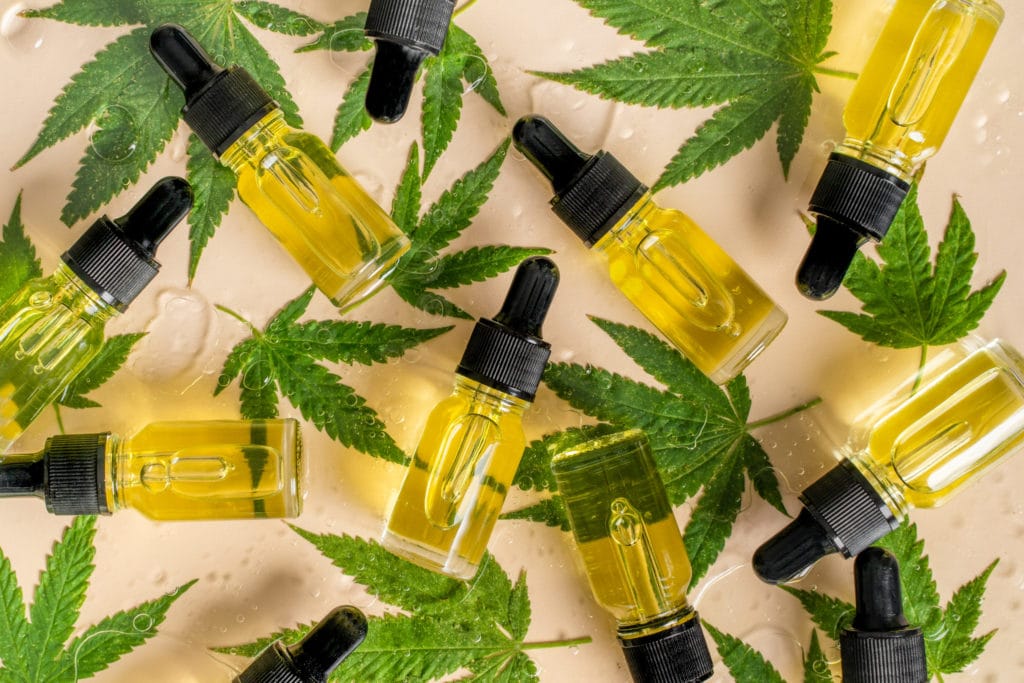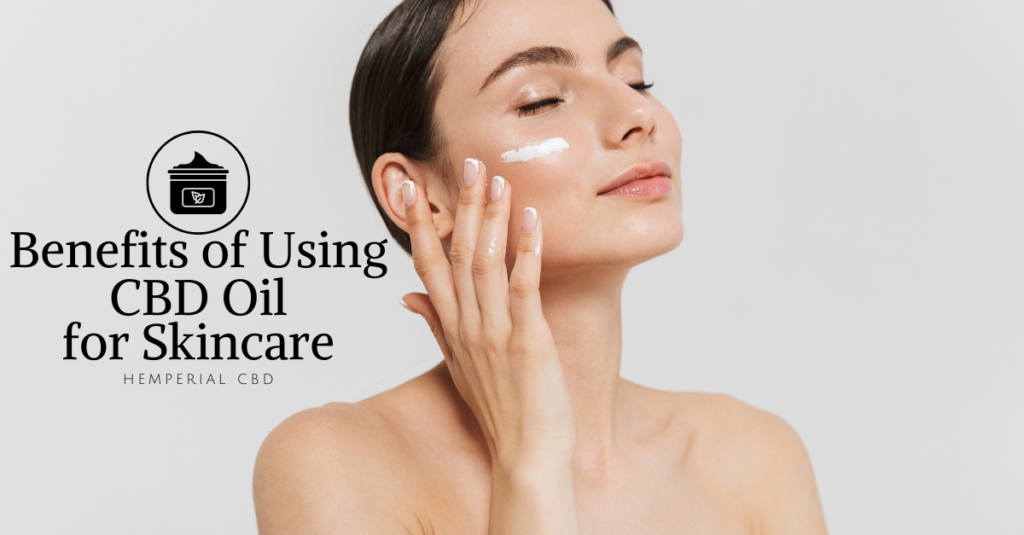If you’re thinking about utilizing CBD oil for skincare, you may have noticed that practically all cosmetic companies offer CBD-infused items.
Now, either this has been exaggerated or there is actually something in the water.
The truth is that CBD provides a wide range of advantages for the skin, from easing stress and physical discomfort to preventing aging and regenerating the skin’s protective layer.
But not all topical CBD oils are created equal. In actuality, the quality, formulations, and efficacy of these products vary greatly.
We at Hemperial CBD work hard to provide the highest caliber oils and topicals. To assist our clients in making the best decision for their needs, we also place an emphasis on education.
Here is a detailed approach to applying CBD oil topically. We’ll go over the advantages, applications, possible drawbacks, and additional all-natural skin care options.
CBD Oil: What is it?
Among the more than 100 cannabinoids contained in cannabis plants, CBD is one. It is closely related to delta-9-tetrahydrocannabinol (THC), the chemical that gives marijuana its pleasurable effects.
CBD won’t make you drunk, though, so you won’t get high from it. The majority of CBD oils on the market are made from hemp or marijuana, two non-psychoactive cannabis species, and these products have a THC content of 0.3% or less. Again, not nearly enough to cause you to become intoxicated.
People can utilize CBD oil, which comes in a variety of concentrations, to achieve a variety of health objectives. You can use CBD oil as a general dietary supplement, for instance, to maintain equilibrium, sound sleep patterns, a healthy response to stress, etc. However, you can also apply a topical formulation to relieve localized discomfort or hydrate your skin using substances like flavonoids, terpenes, and cannabinoids (e.g. essential oils, plant extracts, healthy fats).
The interaction of CBD with the endocannabinoid system is what makes CBD oil such a diverse substance (ECS). Numerous physiological and psychological processes are regulated by the ECS, and the skin’s deeper layers include its own collection of cannabinoid receptors, according to studies.
CBD Oil and Skin: Does CBD Work for Skin Health?

The use of CBD oil for skin has so far shown encouraging outcomes in study. Please be aware that until the FDA finally decides on its position regarding the efficacy and safety of CBD, we are not permitted to make health claims about it owing to compliance issues.
That being said, we can tell you a lot about the general advantages of CBD for the skin – wink, wink! From there, you can conduct your own research and test out various items to accomplish your objectives.
To the point now. Here is how CBD affects skin:
Skin breakouts and CBD
Skin breakouts, including pimples, blackheads, and whiteheads, are frequent skin issues caused by an overproduction of sebum, which clogs hair follicles and causes inflammation in the skin.
In a 2014 study, the authors assessed how CBD affected human cells that produce sebum (sebocytes).
The greasy substance the skin generates is called sebum. Sebum serves as a barrier for our skin, but too much of it can cause acne. According to the study, CBD can stop sebocytes from secreting an excessive amount of sebum.
The potential antibacterial and antifungal properties of cannabis were emphasized in a 2016 study. The result, however, applied to the entire cannabis plant, not only CBD.
And last, researchers in a 2019 study came to the conclusion that CBD might be helpful for lessening the visibility of scars.
CBD versus Aging and Wrinkles
A 2017 study in Cannabis and Cannabinoid Research confirmed CBD’s effectiveness as an antioxidant. The antioxidative and calming qualities of CBD may aid with aging and wrinkles since oxidative stress can harm skin cells and hasten the aging process.
Dryness and Itching vs CBD
According to a 2019 study, CBD may help with dryness and irritation. Due to its interaction with the ECS, CBD can hydrate and nourish the skin. It also renews its barrier of defense by turning on the CB2 receptors in the epidermis. Because of this, CBD is suitable for those with sensitive skin.
Infections and CBD
Cannabis skin care products may be helpful if bacterial or fungal infections are the source of your skin’s irritation. Cannabinoids, including CBD and supporting cannabinoids, as well as other hemp compounds including terpenes, flavonoids, plant waxes, and other substances in your skincare product, have antibacterial and antifungal characteristics.
Is it Safe to Apply CBD to Skin?
The World Health Organization (WHO) believes that CBD is safe and that people tolerate it well. However, if you take too much, there could be some minor negative effects to using CBD.
Typical negative effects of high CBD dosages include:
- Drowsiness
- Fatigue
- Changes in appetite
- Diarrhea
Remember that CBD can interact with drugs and supplements because it is a powerful inhibitor of liver metabolic enzymes. Consult your doctor about the use of CBD oil for skin if you take any prescription or over-the-counter medications.
How to Apply CBD Topicals and Oils to the Skin

In order to help you understand how and when to use the product as well as how much to apply, CBD products come with instructions on the label and package.
Glass bottles with droppers are used to store CBD oils. The dropper, which normally holds 1mL of oil, aids in measuring out the desired quantity. Place the dropper with the oil within it under your tongue, holding it there for up to 60 seconds. The active elements flow into the circulation through a wide network of microscopic blood vessels in your mouth, which will enhance CBD absorption and hasten the beginning of effects if you do this.
The use of CBD topicals is simpler. Simply apply the product to the skin according to the manufacturer’s directions. The recipe, potency, and fat base of the product will determine how much of it you need to receive the benefits of CBD.
How to Pick the Best CBD Skincare Products
The Food and Drug Administration (FDA) does not control the CBD market, so it is the consumer’s responsibility to investigate the reliability of CBD vendors as well as the caliber and safety of such goods.
When purchasing CBD topicals and oil for the skin, look for items that:
- Adhere to the 2018 Farm Bill’s 0.3% THC limit or less
- Have undergone testing for purity, phytochemical profile, CBD content, and THC levels by a third-party laboratory (passed tests for heavy metals, microbes, and pesticides).
- Come from businesses from which the FDA has not sent a warning notice.
- Have certificates of analysis with batch specifics (COA)
- Are produced from domestic farms’ organic hemp.
- Contain the full spectrum of flavonoids, terpenes, and cannabinoids, or at least a broad spectrum of them.
You should also think about the following factors:
- CBD potency
- Price or the costs
- The reputation of your brand
- Customer service
- User reviews
Other Natural Plant-Based Skincare Solutions
One of the many natural medicines that may help with skin care is CBD. Topicals containing CBD, such as creams, balms, ointments, lotions, and CBD roll-on sticks, also contain some of these chemicals.
If you wish to maximize CBD’s benefits for your skin’s health, use these ingredients:
- Aloe vera –According to studies from 2014 and 2017, aloe vera is an exceptional moisturizer with antibacterial, anti-inflammatory, and wound-healing qualities.
- Honey –This traditional superfood has demonstrated anti-inflammatory, hydrating, and wound-healing qualities. In a 2017 analysis, the scientists came to the conclusion that honey can treat burns and wounds, while a 2016 review discovered it may help boost immunological function.
- Tea tree oil – The antibacterial, anti-inflammatory, and wound-healing effects of tea tree oil were revealed in a 2013 assessment of studies. Another review that praised the product’s anti-acne properties was released later in 2015.
- Coconut oil – A 2016 article described how coconut oil can dramatically increase the hydration of the skin and moisturize it. In a 2019 study, the research team discovered that coconut oil may strengthen the skin’s protective barrier and shield it from inflammation.
Can CBD be Applied to Pet Skin?
Because pets have an endocannabinoid system as humans do, you can put CBD on their skin. CBD can support healthy skin and coating, as well as help with physical discomfort, itching, dryness, and redness, according to studies on rats, dogs, and horses.
Just be careful that your CBD pet oil doesn’t include any allergies that could aggravate the skin even more. We constantly stress the need of purchasing your products from vendors who have current test reports and are open and transparent about their farming and extraction practices.
The Verdict on Skin and CBD Oil
Human skin is the biggest and most absorbing organ. Additionally, it is frequently subjected to environmental harm and other forms of oxidative stress, such as poor dietary practices, disregard for proper skincare practices, and coexisting medical conditions.
CBD topicals are your best bet if you want to improve the health of your skin through the use of CBD, whether it’s for its antioxidant, nourishing, or calming effects. Two different topical products are available at Hemperial CBD: an icy-menthol roll-on gel and a cooling balm. Both goods come with certificates of analysis that are batch-specific and have undergone three separate tests at a lab that has received ISO certification.
